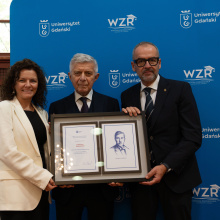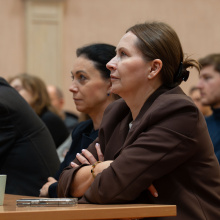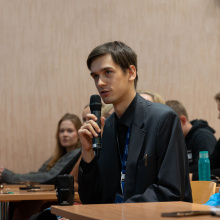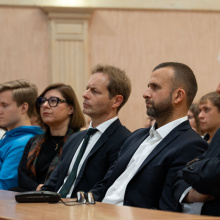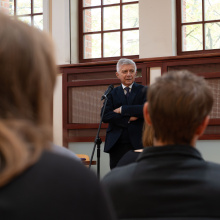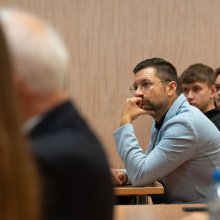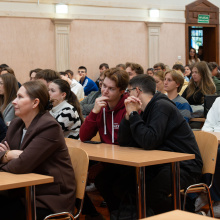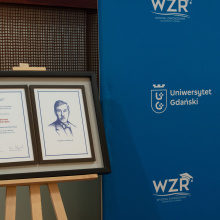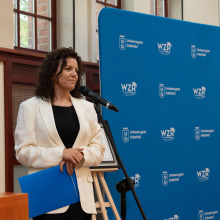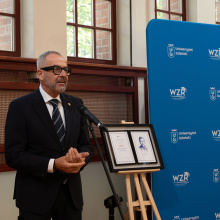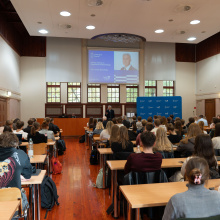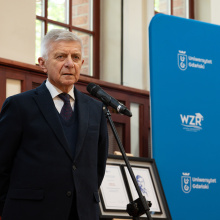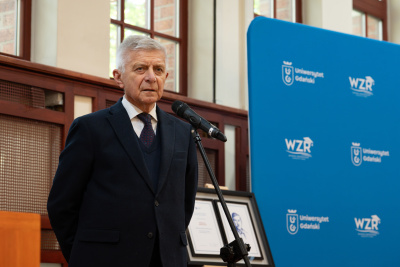
Prof. Marek Belka, an eminent economist, former Prime Minister and former President of the National Bank of Poland, has taken up the honorary Eugeniusz Kwiatkowski chair at the University of Gdańsk for the 2025/2026 academic year. In his inaugural lecture entitled ‘Poland and Europe in times of uncertainty’, he spoke about the consequences of the economic policy of the United States and US President Donald Trump for the economy of the Old Continent.
The ceremony and lecture took place on 14 October 2025 at the Faculty of Management in Sopot. During the event, the Rector of the University of Gdańsk, prof. Piotr Stepnowski, reminded the audience that for the past four years, the named chair at the University of Gdańsk had been held by a succession of eminent scientists: prof. Leszek Balcerowicz, prof. Hanna Suchocka, and prof. Andrzej Rychardt.
Destabilisation of the global economy
Next, in his lecture entitled ‘Poland and Europe in times of uncertainty,’ prof. Marek Belka presented the impact of the current US President on the economic policy not only of the Old Continent, but of the entire world.
‘Donald Trump's administration did not initiate the process of destabilising the global economy. This destabilisation is already underway. As some say, a tectonic shift in the balance of power is taking place. The so-called West is losing ground to the so-called Global South. Simply put, China is becoming the second economic power, and according to some indicators, the number one economic power. A new power is emerging in the form of India, and on the other hand there is Europe, which continues to be an economic power, primarily in terms of trade, but is increasingly seen around the world as an example of a satisfied society, living at the highest possible level, losing its competitiveness to both China and the United States,’ said the economist.
Prof. Marek Belka reminded us that we often look to the United States as an unrivalled model in terms of economic competitiveness and the dynamics of the development of so-called disruptive industries, i.e. sectors of the economy that are revolutionising social and economic life. ‘We often complain, and rightly so, that of the 20 largest companies, 17 are from the United States, three are from China, and European companies are further down the list,’ he commented.
The former president of the National Bank of Poland assessed that, on the one hand, Europe is afraid of losing its competitiveness, and on the other, it is afraid of losing its way of life. ‘It's not just about the standard of living, but about the way of life. In Europe, we are concerned about the balance between work and life. No one in China or the United States would even think of considering such things,’ he explained, referring to the lack of a pension system in China and Americans living from paycheck to paycheck.
Later in his lecture, the former president of the National Bank of Poland pointed out that the weakening of the dollar is affecting transactions around the world. The scientist also said that the result of Trump's economic policy is a ‘decalibration of the global trading system’: ‘It is impossible to know what to expect in a week, two weeks or a month. The phenomenon of supply chain contraction is becoming increasingly common. It turns out that globalisation is beginning to be replaced by regionalisation, that instead of trading with the whole world, we prefer to trade with countries that are closer to us,’ he noted, adding that Poland could benefit from this if some of the production from Asia is moved closer, e.g. to our country.
‘What is happening in the United States is important for the whole world. And today's world is very interconnected. Therefore, the destabilisation of trade, but even more so the destabilisation of financial flows, interest rates and exchange rates, will affect everyone. Europe is a very sensitive region of the world because it is not very dynamic, very dependent on external markets, and very concerned about maintaining its current standard of living,’ the economist emphasised at the end.
Prof. Marek Belka was born in Łódź and became associated with the University of Łódź in an academic capacity. He divided his time between his beloved city, the capital and Brussels. In 1990, he became an advisor and consultant to the Ministry of Finance. In the following years, his involvement in Polish politics grew. He was Deputy Prime Minister and Minister of Finance in 1997 in the government of Włodzimierz Cimoszewicz, and in 2001-2002 in the government of Leszek Miller. From 2 May 2004 to 31 October 2005, he was Prime Minister of Poland. In 2010, he was elected for a six-year term as President of the National Bank of Poland. In the previous term, he was a Member of the European Parliament.
The economist has published over 100 scientific papers, mainly on the theory of money and anti-inflationary policy in developing countries. He specialises in applied economics and contemporary economic thought. He is a member of the Committee on Economic Sciences of the Polish Academy of Sciences.

